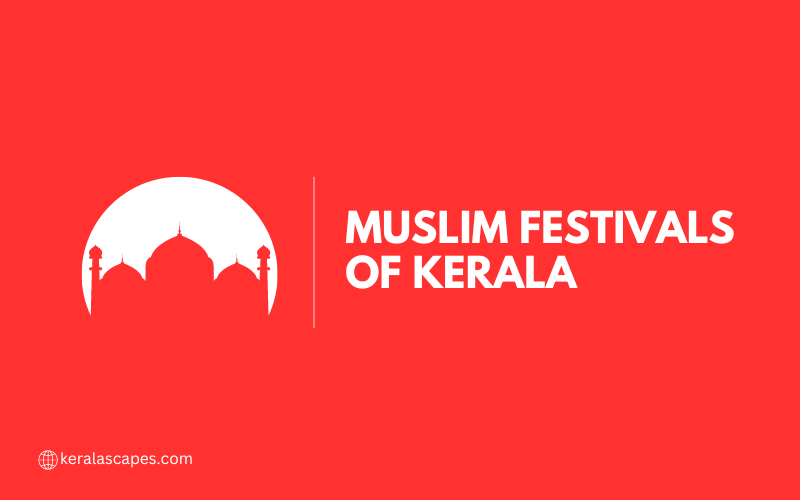Muslim Festivals of Kerala: Rituals, and Celebrations

Kerala, a state recognized for its rich cultural diversity and harmonious coexistence, celebrates a variety of festivals that reflect the traditions and customs of its various communities. The Muslim community in Kerala adds its own vibrant colors to the cultural tapestry with a series of festivals that are celebrated with great fervor and enthusiasm. From the joyous feasts of Eid to the solemn observance of Muharram, these Muslim festivals offer a unique glimpse into the religious and cultural heritage of the community. In this comprehensive guide, we will explore the rituals, significance, and exuberant celebrations of Muslim festivals in Kerala.
Eid-ul-Fitr – The Festival of Breaking the Fast:
Eid-ul-Fitr, also known as “Ramadan Eid,” is a Muslim holiday that marks the end of the holy month of Ramadan. During Ramadan, Muslims fast from dawn to sunset. Eid-ul-Fitr begins with a special prayer called “Salat al-Eid,” which is held in mosques and open areas. Muslims wear their best clothes and participate in communal prayers, seeking forgiveness and thanking Allah for the strength to complete the fast. It is a time of spreading joy and love, and families come together to share delicious meals and exchange gifts. Charity, known as “Zakat al-Fitr,” is also an essential part of Eid-ul-Fitr, ensuring that the less fortunate can participate in the festivities.
Eid-ul-Adha – The Festival of Sacrifice:
Eid al-Adha, also known as Bakrid or the Festival of Sacrifice, is celebrated to commemorate the Prophet Ibrahim’s willingness to sacrifice his son Ishmael in obedience to Allah’s command. Muslims offer animal sacrifices, typically goats or sheep, in a symbolic act, and distribute the meat among family, friends, and the needy. The festival begins with the Eid prayer, followed by communal gatherings and lavish feasts. It is a time of reflection, unity, and sharing blessings with others.
Muharram – The Mourning Month:
Muharram is the first month of the Islamic lunar calendar and is very important for Muslims, especially Shias. It is a month of mourning, particularly on the 10th day, known as Ashura. On this day, Shia Muslims participate in processions and reenactments of the Battle of Karbala, in which Imam Husayn, the grandson of Prophet Muhammad, was martyred. The atmosphere is somber, and devotees participate in processions, recite elegies, and engage in acts of charity. Muharram is a time for introspection and remembrance of the sacrifices made by the Prophet’s family.
Milad-un-Nabi – The Birth of Prophet Muhammad:
Milad-un-Nabi, also known as Mawlid, is a holiday celebrated by Muslims to mark the birth of the Prophet Muhammad, the founder of Islam. On this day, Muslims gather in mosques and homes to offer prayers and discuss the Prophet’s life and teachings. The celebrations also include sermons, religious lectures, and the recitation of poems praising the Prophet Muhammad’s virtues. Charity and acts of kindness are encouraged during this time, in line with the Prophet’s teachings of compassion and love for humanity.
Ramadan – The Month of Fasting:
Ramadan, the ninth month of the Islamic calendar, is a holy time for Muslims worldwide when they fast, pray, and reflect. During this month, Muslims abstain from food, drink, and worldly pleasures from sunrise to sunset. The fast is broken each evening with a lavish spread of traditional delicacies called Iftar. Ramadan is a time of great spiritual significance, as it is believed that the Quran was revealed to Prophet Muhammad during this month. It is a time of heightened spirituality, self-discipline, and seeking closeness to Allah.
From the joyous festivities of Eid-ul-Fitr and Eid-ul-Adha to the solemn observance of Muharram and Milad-un-Nabi, each celebration embodies the core values of Islam, including compassion, unity, and charity. These festivals offer a significant occasion for Kerala’s Muslims to reinforce their faith, strengthen family bonds, and promote harmony and understanding among diverse communities. As we partake in the celebrations of these Muslim festivals, let us embrace unity and respect, celebrating the essence of our shared humanity.
Frequently Asked Questions on Alappuzha
What is Eid-ul-Fitr and how is it celebrated?
Eid-ul-Fitr, also known as “Ramadan Eid,” marks the end of the holy month of Ramadan, during which Muslims fast from dawn to sunset. It begins with a special prayer called “Salat al-Eid,” followed by communal prayers in mosques and open areas. Muslims wear their best clothes, share delicious meals with family and friends, and exchange gifts. Charity, known as “Zakat al-Fitr,” is also an essential part of Eid-ul-Fitr, ensuring that the less fortunate can participate in the festivities.
What is Eid-ul-Adha and how is it celebrated?
Eid-ul-Adha, also known as Bakrid or the Festival of Sacrifice, commemorates the willingness of Prophet Ibrahim to sacrifice his son Ishmael in obedience to Allah’s command. Muslims offer animal sacrifices, typically goats or sheep, and distribute the meat among family, friends, and the needy. The festival begins with the Eid prayer, followed by communal gatherings and lavish feasts. It is a time of reflection, unity, and sharing blessings with others.
What is Muharram and how is it observed?
Muharram is the first month of the Islamic lunar calendar and is significant, especially for Shia Muslims. The 10th day, known as Ashura, is a day of mourning, reenacting the Battle of Karbala, in which Imam Husayn, the grandson of Prophet Muhammad, was martyred. Shia Muslims participate in processions, recite elegies, and engage in acts of charity. Muharram is a time for introspection and remembrance of the sacrifices made by the Prophet’s family.
What is Milad-un-Nabi and how is it celebrated?
Milad-un-Nabi, also known as Mawlid, celebrates the birth of the Prophet Muhammad, the founder of Islam. Muslims gather in mosques and homes to offer prayers and discuss the Prophet’s life and teachings. The celebrations include sermons, religious lectures, and recitation of poems praising the Prophet’s virtues. Charity and acts of kindness are encouraged during this time, in line with the Prophet’s teachings of compassion and love for humanity.
What is Ramadan and how is it observed?
Ramadan, the ninth month of the Islamic calendar, is a holy time for Muslims worldwide. It is a time of fasting, praying, and reflecting on one’s spirituality. Muslims abstain from food, drink, and worldly pleasures from sunrise to sunset. The fast is broken each evening with a lavish spread of traditional delicacies called Iftar. Ramadan is a time of heightened spirituality, self-discipline, and seeking closeness to Allah. It is believed that the Quran was revealed to Prophet Muhammad during this month.
Stay tuned to Kerala Scapes for more interesting articles on Kerala.
